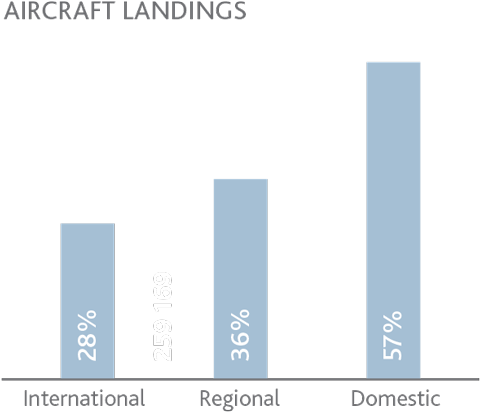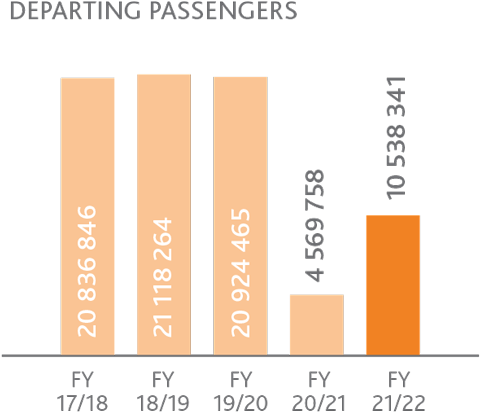OUR FOOTPRINT
In South Africa, our footprint includes airports in nine key business and tourism hubs, which service routes throughout the country.
Globally, our presence has changed during the past two reporting periods. Our sister airport agreements with Munich Airport Group in Germany and Airports of Thailand remain active, but we concluded the sale of our shares in Mumbai International Airport Private Limited in February 2021. The sale of our stake in the Guarulhos International Airport in São Paulo (Brazil) is currently under consideration.

PASSENGER STATISTICS



OUR ONGOING JOURNEY THROUGH THE COVID-19 PANDEMIC
THE IMPACT ON AIR TRAVEL
As we reported in our 2021 Integrated Annual Report, the aviation industry was one of the hardest hit by the pandemic, which triggered a complete collapse of the air travel industry. Although there was a slow recovery throughout the 2022 financial year, this was hampered by the third and fourth waves, which saw air travel being severely restricted around the world. It was only when lockdown regulations at home and abroad were relaxed in the run up to the 2021 year-end holidays that recovery began to pick up pace.
By 31 March 2022, the ACSA network had recovered 49% of its pre-COVID passenger throughput, with 20.9 million passengers having passed through our airports in the preceding 12 months. Domestic passengers accounted for 83% of these, with business and government accounting for 50% of all domestic travel, an above-average proportion. Based on internal traffic forecasts and the forecasts of industry bodies, air traffic is, however, only expected to recover to pre-pandemic levels after a period of five years, which gives some indication of how extensive the impact of COVID-19 has been.
The ACSA network of airports nevertheless remains the world’s largest network under a single authority, with O.R. Tambo International in Johannesburg being the only mega hub on the African continent. And, as air travel slowly returns to normal, the local aviation industry has unique opportunities to develop new routes and expand into new
markets, all of which will support the Group’s growth strategy.
A full analysis of passenger traffic trends and statistics during the reporting period is given in the Our Operating Environment section
THE HEALTH AND SAFETY OF OUR STAKEHOLDERS
As in the previous period, ACSA adhered to all of the regulations for the management of COVID-19 as issued by the South African Civil Aviation Authority (SACAA) throughout the 2022 financial year.
Our first priority was to protect the health and safety of our staff, passengers, suppliers and the other stakeholders working in our airports. This meant we had to be extremely adaptable within the context of an uncertain and ever-changing operating environment.
We therefore continued to implement rigorous health and safety protocols at all of our airports in order to detect, manage and prevent the spread of the virus. This was done within the framework of the pandemic management processes and procedures we had put into place in 2020 in compliance with all South African and international regulations and protocols. In addition, ACSA is a registered member of the Airport Council International (ACI) Airport Health Accreditation Programme and we work closely with all of our airport stakeholders to ensure that they comply with our health and safety requirements.
RECOVERING AND SUSTAINING OUR BUSINESS
In the previous reporting period, we undertook a full review of our Group strategy and business model in order to manage the impact of the pandemic, define our path to recovery and secure value creation in the short, medium and long term. This, in turn, led to the development of a supplementary Recover and Sustain Strategy supported by a revised Financial Plan. These allowed for such measures as increasing our short-term banking facilities, stringently managing working capital, and reducing both operational and capital expenditure.
Our strategic pillars, which define our core focus on running airports, developing airports and growing our footprint, have nevertheless remained intact and continue to be aligned to global best practice.
During the 2022 reporting period, we went on to develop a Revised Governance Framework and Operating Model, a Capability Model and a new organisational structure, engaging with relevant stakeholders throughout the process.
Our business has shown remarkable resilience in the face of such an unprecedented challenge and, as the air travel and cargo transportation markets recover from the events of the past two years, we remain as committed as ever to our strategic objectives and our role as a driver of transformation and socio-economic development.
STAKEHOLDER ENGAGEMENT
As an airports company, we operate within a complex ecosystem and all of our stakeholders are an intrinsic part of our business.
The pandemic represented the greatest disruption ever experienced by the aviation industry and resulted in the partial or total collapse of many aviation-related businesses and markets. Throughout both the reporting period and the previous period, we remained committed to supporting our stakeholders by seeking to understand the challenges they were facing and by reaching agreements that reflected our commitment to them. They, in turn, actively supported us throughout the process of reviewing and adjusting our strategy and business model.
As a result, our partnerships with our stakeholders have evolved in a very positive way and these vital relationships have been re-energised by working together to face such a significant crisis.






